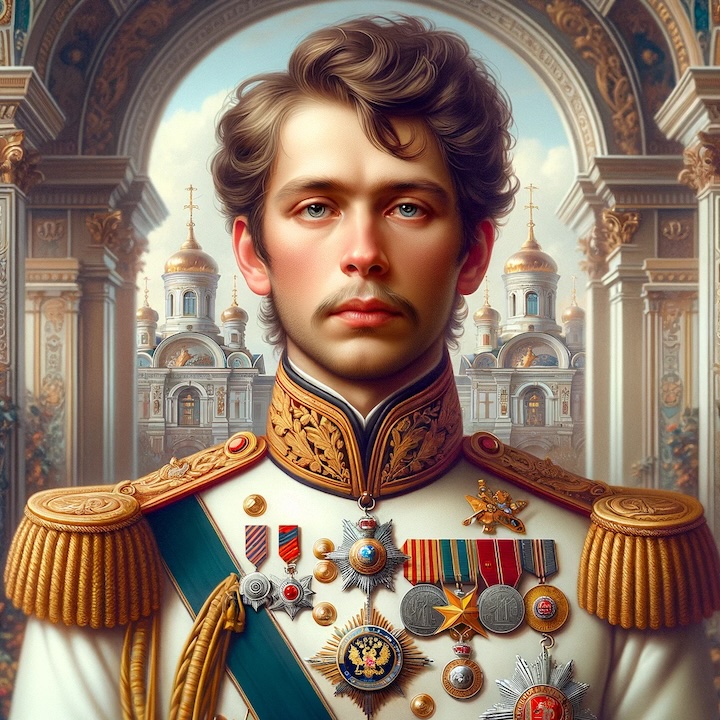Alexander I (1777-1825)

Alexander became Czar in 1801; was the son of Emperor Paul and succeeded him to the throne after Paul was assassinated. Although the early years of his reign were marked by various reform efforts, Alexander embraced policies in his later years that alienated the people. Among other events, Alexander participated in the defeat of Napoleon in 1813.
Alexander I, born on December 23, 1777, in Saint Petersburg, Russia, was one of the most enigmatic and complex figures in Russian history. He became the Czar of Russia in 1801 after the assassination of his father, Emperor Paul I. His reign, which lasted until his death in 1825, was marked by significant events both domestically and internationally, including early attempts at liberal reforms, shifting political alliances, and his pivotal role in the defeat of Napoleon Bonaparte.
Early Life and Ascension to the Throne
Alexander Pavlovich was the eldest son of Emperor Paul I and Maria Feodorovna. He was educated under the guidance of his grandmother, Empress Catherine the Great, who had high hopes for him. Catherine ensured that Alexander received a broad and enlightened education, exposing him to the ideas of the Enlightenment and the principles of government and law. This early education would influence his early reign, where he appeared as a reform-minded monarch.
In 1801, Alexander ascended to the throne under tragic circumstances. His father, Emperor Paul I, had become increasingly erratic and autocratic during his reign, leading to widespread discontent among the Russian nobility and military. This dissatisfaction culminated in a palace coup, during which Paul was assassinated, possibly with the tacit approval or knowledge of Alexander himself, though this remains a topic of historical debate. At the age of 23, Alexander became Czar of Russia, a position that would place him at the center of European and Russian history during a tumultuous period.
Early Reign and Reform Efforts
The early years of Alexander’s reign were characterized by a strong desire to reform the Russian state and modernize its institutions. He surrounded himself with a group of young, idealistic advisors known as the “Unofficial Committee,” who shared his aspirations for change. Among the key figures in this circle were Prince Adam Czartoryski, Count Paul Stroganov, and Count Nikolay Novosiltsev.
Alexander’s early reforms included efforts to streamline the government bureaucracy, improve education, and codify laws. He founded several universities and educational institutions, and his government began drafting plans for a constitution and the abolition of serfdom, although these plans were never fully realized. Alexander sought to position himself as a benevolent ruler who could bring about enlightened changes while preserving the autocratic structure of the Russian Empire.
Shifts in Policy and the Napoleonic Wars
As Alexander’s reign progressed, his enthusiasm for reform began to wane, particularly after encountering resistance from the nobility and conservative elements within the state. His focus shifted increasingly to foreign policy, especially with the rise of Napoleon Bonaparte in France. Initially, Alexander sought to maintain a diplomatic relationship with Napoleon, even forming an alliance with France in 1807 after the Treaties of Tilsit. However, this alliance was fragile and driven by political expediency rather than genuine trust.
The relationship between Russia and France deteriorated rapidly, leading to Napoleon’s ill-fated invasion of Russia in 1812. Alexander played a critical role in the defeat of Napoleon, using the harsh Russian winter and scorched-earth tactics to weaken the French army as it advanced towards Moscow. The disastrous retreat of Napoleon’s Grand Army marked a turning point in the Napoleonic Wars and established Alexander as one of the leading figures in the coalition that eventually defeated Napoleon in 1813.
The Congress of Vienna and Later Reign
After the defeat of Napoleon, Alexander emerged as a key player in the Congress of Vienna (1814-1815), where the victorious powers sought to redraw the map of Europe and restore stability after years of revolutionary upheaval. Alexander’s vision for post-Napoleonic Europe was driven by a mix of conservative and idealistic principles. He championed the establishment of the Holy Alliance, a coalition of Christian monarchies aimed at preserving peace and suppressing revolutionary movements. This alliance reflected his growing conservatism and his belief in the divine right of kings.
Domestically, Alexander became increasingly autocratic in his later years, reversing many of his earlier liberal reforms. He grew more suspicious of liberal ideas and revolutionary movements, particularly after the Decembrist Revolt of 1825, an unsuccessful attempt by liberal Russian officers to force constitutional reform. This revolt occurred shortly after Alexander’s death, signaling the extent of discontent that had grown during his later reign.
Death and Legacy
Alexander I died unexpectedly on December 1, 1825, in the southern Russian city of Taganrog. His death was shrouded in mystery, leading to various rumors and legends, including the belief that he had faked his death and lived out his days as a monk. His sudden death led to a succession crisis, as his brother Nicholas I ascended the throne amid the chaos of the Decembrist Revolt.
 >
>